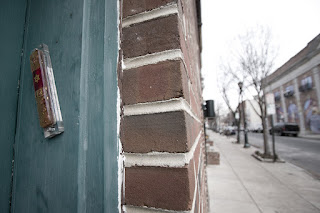I have been thinking about religion a lot lately. I have been really looking at what I believe, and why I believe what I believe. I am LDS. I have served a mission, and have grown up going to church and paying tithing. I am happy of who I am, however, I have been raised by parents who have taught me that other religious views and beliefs should be respected, and when possible learned or taught. I remember several times when Jehova’s Witnesses have knocked on our door, and my dad would kindly talk to them as they offered him a pamphlet, that he kindly would except.
One of my fondest memories is when my father placed a Mezuzah on our front door. I didn’t really understand why he would do such a thing, so I asked him to explain it to me.
‘Mezuzah’ is the Hebrew word for ‘doorpost’. The Mezuzah is a piece of parchment that is usually contained in a small decorative case that is usually inscribed with specified Hebrew verses from the Torah. (Deuteronomy 6:4-9 and 11:13-21).
Our ‘Mezuzah has stayed on our doorpost for more than a decade. Through the my adolescence I have seen many people look at that Mezuzah as they came to our door. Some people have asked what it is, and some have asked why we have it on our door. My dad has explained several times the meaning of it.
I find that the symbolism is beautiful, and I have a deep respect for the belief behind it.
We have been learning a lot about rhetoric in my English class. Rhetoric as defined by Burke was said to be, ”The use of words by human agents to form attitudes or induce actions in other human agents.” Rhetoric was used in ancient Athens to resolve issues and discuss disputes in their community. The disputes usually were talked through the process called “invention” which Aristotle defined as, “finding and displaying the available arguments on any issue.” As the people would listen to the arguments of another they would discuss their beliefs and decide on a final decision. They all knew that they all would need to listen to each person as they discussed their argument.
Living in Utah I am immersed with many people that have my own faith, and many who don’t. I have seen arguing in person and on social media of ‘who is right?’ instead of the most important question of ‘what is right?’. Discussions of belief usually are absent and replaced by a declaration of belief. Sometimes the ‘Christ’ I feel is taken out of Christianity. I have seen many posts lately on Facebook that try to minimize or make fun of other's belief systems. We all have our right of believing what we want. But, we don’t have the right to try to make someone believe what we believe, which I feel is done more often then not.
I have had the amazing opportunity to have friends of different walks of life.
Their differences of belief has not 'shattered me', but has made me understand, and respect the individual more. I have even changed my outlook on several different subjects. ‘Invention’ has had an empowering effect on me throughout my life. It doesn’t make me a bad ‘Mormon' if I listen, understand, or respect another person’s beliefs or points of view. In my opinion it is a core principle of me being a good Christian.
Buddist.
Atheist.
Baptist.
Homosexual.
Heterosexual.
Democrat.
Republican.
Liberal.
...The list goes on. Do you want to know what? I love them all.
Their differences of belief has not 'shattered me', but has made me understand, and respect the individual more. I have even changed my outlook on several different subjects. ‘Invention’ has had an empowering effect on me throughout my life. It doesn’t make me a bad ‘Mormon' if I listen, understand, or respect another person’s beliefs or points of view. In my opinion it is a core principle of me being a good Christian.
Please Check out Rebecca Adam's blog post on rhetorical thinking:
Citations
Crowley, Sharon, and Debra Hawhee. Ancient Rhetorics for Contemporary Students. Boston: Allyn and Bacon, 1999. Print.
Blakesley, David. The Elements of Dramatism. New York: Longman, 2002. Print.

I enjoyed your post and agree that the religious beliefs of others need to be respected. It is interesting how there are certain buzzwords that everyone uses, but we only think we know what they mean or don't recognize that there are other definitions that can apply as well. The power of words is a powerful thing indeed.
ReplyDelete